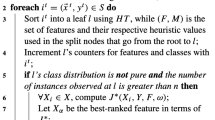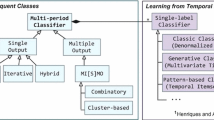Abstract
As time passes by, the performance of real-world predictive models degrades due to distributional shifts and learned spurious correlations. Typical countermeasures, such as retraining and online learning, can be costly and challenging in production, especially when accounting for business constraints and culture. Causality-based approaches aim to identify invariant mechanisms from data, thus leading to more robust predictors at the possible expense of decreasing short-term performance. However, most such approaches scale poorly to high dimensions or require extra knowledge such as data segmentation in representative environments. In this work, we develop the Time Robust Trees, a new algorithm for inducing decision trees with an inductive bias towards learning time-invariant rules. The algorithm’s main innovation is to replace the usual information-gain split criterion (or similar) with a new criterion that examines the imbalance among classes induced by the split through time. Experiments with real data show that our approach improves long-term generalization, thus offering an exciting alternative for classification problems under distributional shift.
Access this chapter
Tax calculation will be finalised at checkout
Purchases are for personal use only
Similar content being viewed by others
Notes
- 1.
- 2.
The source code and datasets used and install instructions are available on GitHub at (https://github.com/lgmoneda/time-robust-tree-paper).
References
Arjovsky, M., Bottou, L., Gulrajani, I., Lopez-Paz, D.: Invariant risk minimization (2019)
Bagnell, J.A.: Robust supervised learning. In: AAAI, pp. 714–719 (2005)
Bareinboim, E., Pearl, J.: Transportability from multiple environments with limited experiments: completeness results. Adv. Neural. Inf. Process. Syst. 27, 280–288 (2014)
Bishop, C.M.: Pattern recognition and machine learning. springer (2006)
Breiman, L.: Random forest. Mach. Learn. 45(1), 5–32 (2001)
Cartwright, N.: Two theorems on invariance and causality. Philos. Sci. 70(1), 203–224 (2003)
City of Chicago : Chicago crime - bigquery dataset (2021), version 1. Accessed 13 Mar 2021. https://www.kaggle.com/chicago/chicago-crime
D’Amour, A., et al.: Underspecification presents challenges for credibility in modern machine learning. CoRR (2020). http://arxiv.org/abs/2011.03395v1
Daoud, J.: Animal shelter dataset (2021), version 1. Accessed 13 Mar 2021. https://www.kaggle.com/jackdaoud/animal-shelter-analytics
Goyal, A., et al.: Recurrent independent mechanisms. arXiv preprint arXiv:1909.10893 (2019)
Gulrajani, I., Lopez-Paz, D.: In search of lost domain generalization. arXiv preprint arXiv:2007.01434 (2020)
Hu, W., Niu, G., Sato, I., Sugiyama, M.: Does distributionally robust supervised learning give robust classifiers? In: International Conference on Machine Learning, pp. 2029–2037. PMLR (2018)
Karimi, K., Hamilton, H.J.: Generation and interpretation of temporal decision rules. arXiv preprint arXiv:1004.3334 (2010)
Karimi, K., Hamilton, H.J.: Temporal rules and temporal decision trees: A C4. 5 approach. Department of Computer Science, University of Regina Regina, Saskatchewan \(\ldots \) (2001)
Ke, N.R., et al.: Learning neural causal models from unknown interventions. arXiv preprint arXiv:1910.01075 (2019)
Locatello, F., Poole, B., Rätsch, G., Schölkopf, B., Bachem, O., Tschannen, M.: Weakly-supervised disentanglement without compromises. In: International Conference on Machine Learning, pp. 6348–6359. PMLR (2020)
Mitchell, T.M., et al.: Machine learning (1997)
Moneda, L.: Globo esporte news dataset (2020), version 11. Accessed 31 Mar 2021. https://www.kaggle.com/lgmoneda/ge-soccer-clubs-news
Mouillé, M.: Kickstarter projects dataset (2018), version 7. Accessed 13 Mar 2021. https://www.kaggle.com/kemical/kickstarter-projects?select=ks-projects-201612.csv
Pearl, J.: Causality. Cambridge University Press, Cambridge, UK, 2nd edn. (2009). https://doi.org/10.1017/CBO9780511803161
Pearson, K.: On a form of spurious correlation which may arise when indices are useed in the measurement of organs. In: Royal Society of London Proceedings, vol. 60, pp. 489–502 (1897)
Peters, J., Bühlmann, P., Meinshausen, N.: Causal inference using invariant prediction: identification and confidence intervals. arXiv preprint arXiv:1501.01332 (2015)
Peters, J., Janzing, D., Schlkopf, B.: Elements of causal inference: foundations and learning algorithms. The MIT Press (2017)
Rabanser, S., Günnemann, S., Lipton, Z.C.: Failing loudly: an empirical study of methods for detecting dataset shift (2018)
Ribeiro, M.T., Singh, S., Guestrin, C.: why should i trust you? explaining the predictions of any classifier. In: Proceedings of the 22nd ACM SIGKDD International Conference on Knowledge Discovery and Data Mining, pp. 1135–1144 (2016)
Schölkopf, B., Janzing, D., Peters, J., Sgouritsa, E., Zhang, K., Mooij, J.: On causal and anticausal learning. arXiv preprint arXiv:1206.6471 (2012)
Shastry, A.: San francisco building permits dataset (2018), version 1. Accessed 13 Mar 2021. https://www.kaggle.com/aparnashastry/building-permit-applications-data
Sionek, A.: Brazilian e-commerce public dataset by olist (2019), version 7. Accessed 13 Mar 2021. https://www.kaggle.com/olistbr/brazilian-ecommerce
Stone, M.: Cross-validatory choice and assessment of statistical predictions. J. Roy. Stat. Soc.: Ser. B (Methodol.) 36(2), 111–133 (1974)
Vaswani, A., et al.: Attention is all you need. arXiv preprint arXiv:1706.03762 (2017)
Wager, S., Athey, S.: Estimation and inference of heterogeneous treatment effects using random forests. J. Am. Stat. Assoc. 113(523), 1228–1242 (2018)
Wilson, A.C., Roelofs, R., Stern, M., Srebro, N., Recht, B.: The marginal value of adaptive gradient methods in machine learning. arXiv preprint arXiv:1705.08292 (2017)
Author information
Authors and Affiliations
Corresponding author
Editor information
Editors and Affiliations
Rights and permissions
Copyright information
© 2022 The Author(s), under exclusive license to Springer Nature Switzerland AG
About this paper
Cite this paper
Moneda, L., Mauá, D. (2022). Time Robust Trees: Using Temporal Invariance to Improve Generalization. In: Xavier-Junior, J.C., Rios, R.A. (eds) Intelligent Systems. BRACIS 2022. Lecture Notes in Computer Science(), vol 13653. Springer, Cham. https://doi.org/10.1007/978-3-031-21686-2_27
Download citation
DOI: https://doi.org/10.1007/978-3-031-21686-2_27
Published:
Publisher Name: Springer, Cham
Print ISBN: 978-3-031-21685-5
Online ISBN: 978-3-031-21686-2
eBook Packages: Computer ScienceComputer Science (R0)




